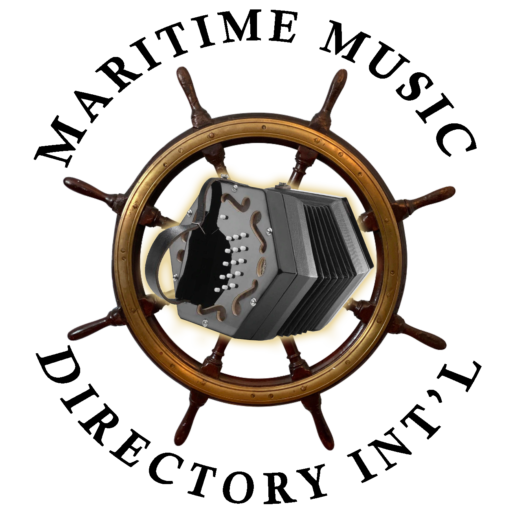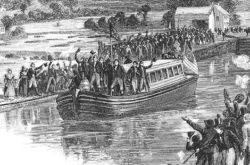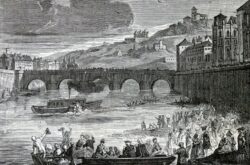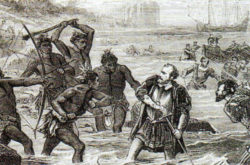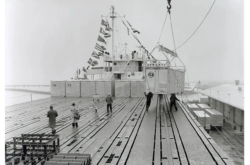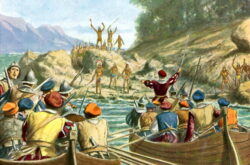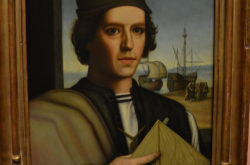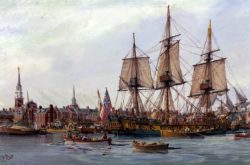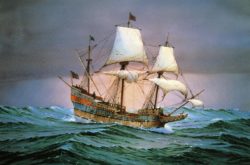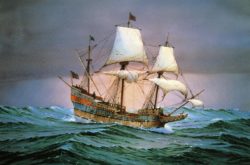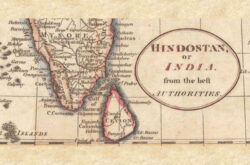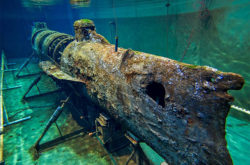Drake Claims California for England (1579)
During his circumnavigation of the world, English seaman Francis Drake anchors in a harbor just north of present-day San Francisco, California, and on 17 June, 1579, claims . . .
Ed Trickett Dies on May 10, 2022
Ed was a well-loved musician in the folk music community. He appeared on over 40 recordings, most of them with Folk Legacy Records, now part of the Smithsonian Folkways . . .
Effingham fights Battle of Gravelines vs. the Spanish Armada (8 Aug 1588)
Five Spanish ships were lost. The galleass San Lorenzo, flagship of Don Hugo de Moncada, ran aground at Calais and was taken by Howard after murderous fighting between the . . .
England Defeats Spanish Armada (29 July, 1588)
Off the coast of Gravelines, France, Spain’s so-called “Invincible Armada” is defeated by an English naval force under the command of Lord Charles Howard and Sir Francis . . .
Erie Canal Opens (1825)
The Erie Canal opens, connecting the Great Lakes with the Atlantic Ocean via the Hudson River. Governor DeWitt Clinton of New York, the driving force behind the project, led the opening ceremonies and . . .
Experimental Steam Ship, Pyroscaphe, travels the Saone (15 July 1783)
15 July 1783 The Marquis de Jouffroy d’Abbans demonstrated his experimental steamship, the Pyroscaphe, on the river Saone at Lyon. An early form of paddle steamer, the . . .
Falls of Halladale Wrecks (1908)
Falls of Halladale was a four-masted iron-hulled barque, built at Greenock in Scotland in 1886 for the Falls Line of Glasgow. She was operated in the long-distance trading . . .
Ferdinand Magellan was killed in the Philippines (1521)
After traveling three-quarters of the way around the globe, Portuguese navigator Ferdinand Magellan is killed during a tribal skirmish on Mactan Island in the Philippines. . . .
First Container Ship Steams from Newark (1956)
The idea of transporting trucks on ships was put into practice before World War II. In 1926 regular connection of the luxury passenger train from London to Paris, Golden . . .
Francis Drake circumnavigates the globe (1580)
English seaman Francis Drake returns to Plymouth, England, in the Golden Hind, becoming the first British navigator to sail the earth.
On December 13, . . .
Francis Drake circumnavigates the globe (26 Sept 1580)
English seaman Francis Drake returns to Plymouth, England, in the Golden Hind, becoming the first British navigator to sail the earth.
On December 13, 1577, Drake set out from England with five ships . . .
French and British battle in the Indian Ocean
The worldwide implications of the American War for Independence are made clear on February 17, 1782 as the American-allied French navy begins a 14-month-long series of five . . .
Frobisher
Sir Martin Frobisher
The advance of science appeared more dramatically in the efforts of adventurous or acquisitive spirits to explore the “great Magnet” (North America) for geographical or commercial purposes. In 1576 Sir Humphrey Gilbert published a suggestive Discourse… for a New Passage to Cataia – i.e., “Cathay,” or China – proposing a northwest sailing through or around Canada. Sir Martin Frobisher, in that year, set out with three small vessels to find such a route. One of his ships foundered, another deserted; he went ahead in the tiny twenty-five-ton Gabriel; he reached Baffin Land, but the Eskimos fought him, and he returned to England for more men and supplies. His later voyages were diverted from geography by a vain hunt for gold. Gilbert took up the quest for a northwest passage, but was drowned in the attempt (1592).
The Age of Reason Begins, Will and Ariel Durant.
It is commonly taught that the English ships were smaller than the Spanish. This is a misconception caused by the practice of Spanish captains to inflate the size of their ships in order to get more compensation for their use in war. At the beginning of the 16th century the English ton was equal to the Spanish tonelada, but by the time of the Armada the tonelada had shrunken to 1/2 ton. In addition, the largest ship in the battle was the 1,100 ton Triumph under the command of Frobisher.
The Cavalier Compendium, Mark & Jennie Gist
The English explorer Martin Frobisher created a gold fever in England in 1578 when he returned from Baffin Island with 200 tons of glittering gold ore. Great preparations were made for getting more and more gold, but it turned out that the ore was merely iron pyrite (“fool’s gold”). It was eventually crushed and used for road repair.
Isaac Asimov’s Book of Facts
Gordon Lightfoot Dies at 84
His rich baritone and gift for melodies made him one of the most popular artists of the 1970s with songs like “The Wreck of the Edmund Fitzgerald” and “If You Could Read My Mind.”
Read . . .
H.L. Hunley sinks during tests (15 Oct 1863)
On October 15, 1863, the H.L. Hunley, the world’s first successful combat submarine, sinks during a test run, killing its inventor and seven crew members.
Horace Lawson . . .
